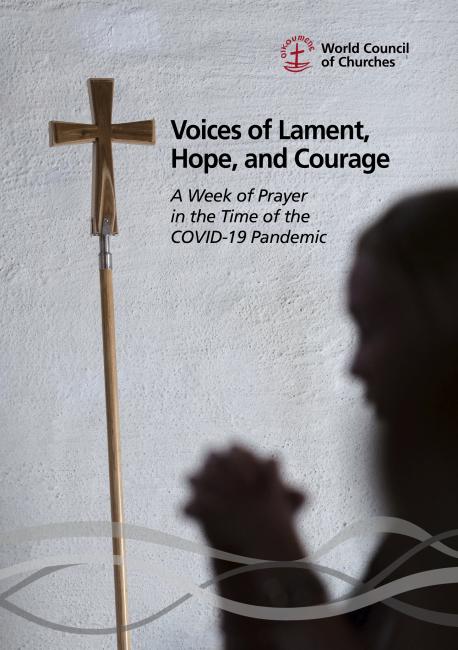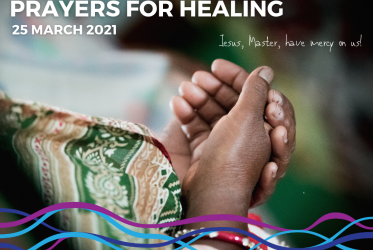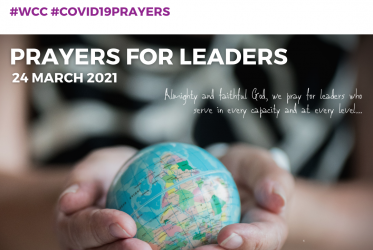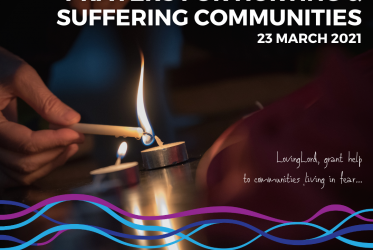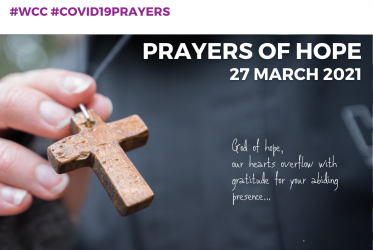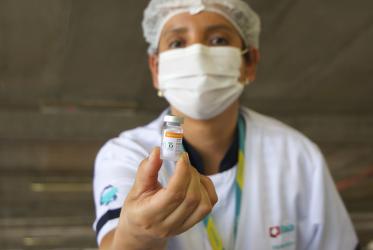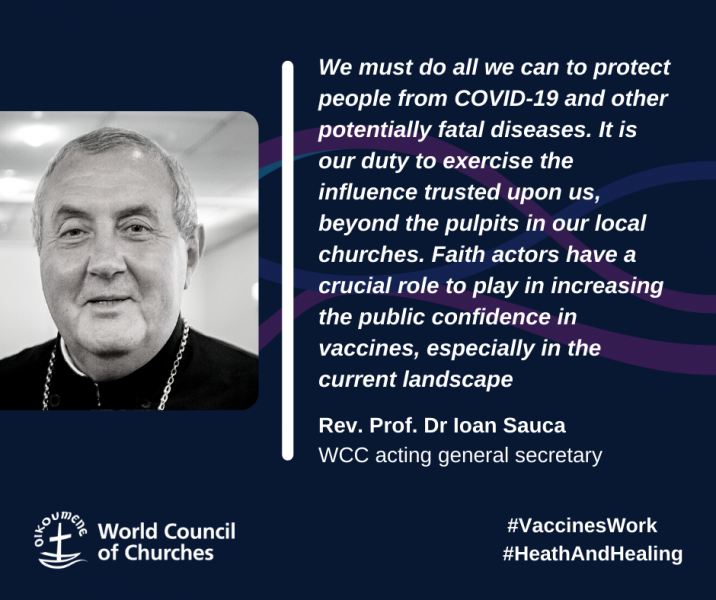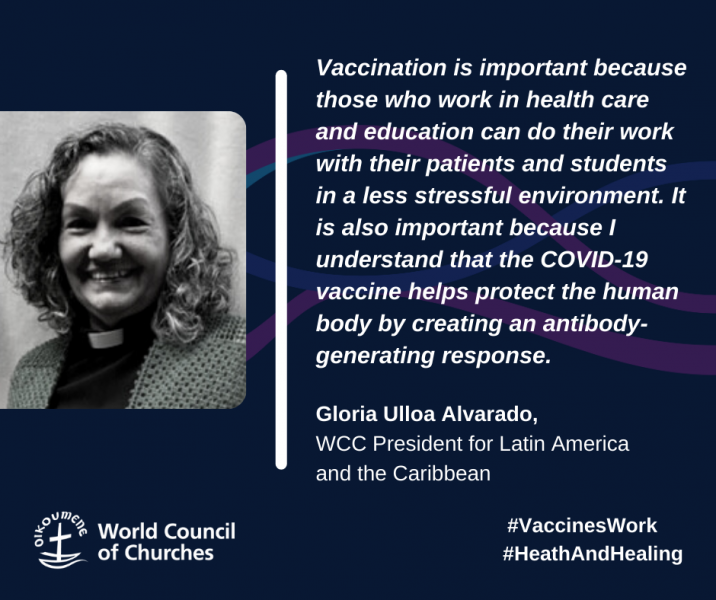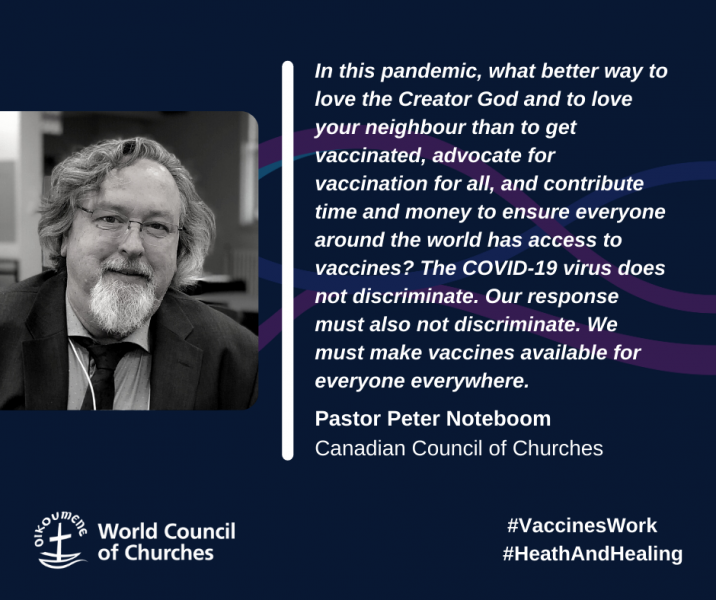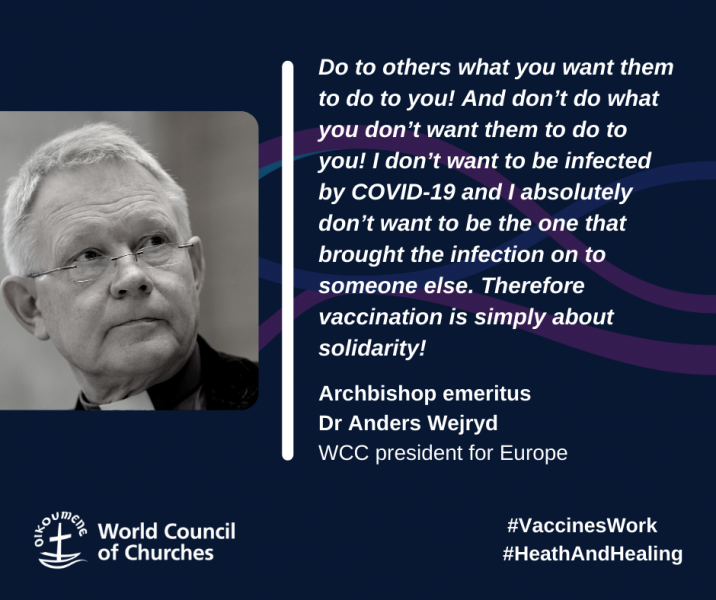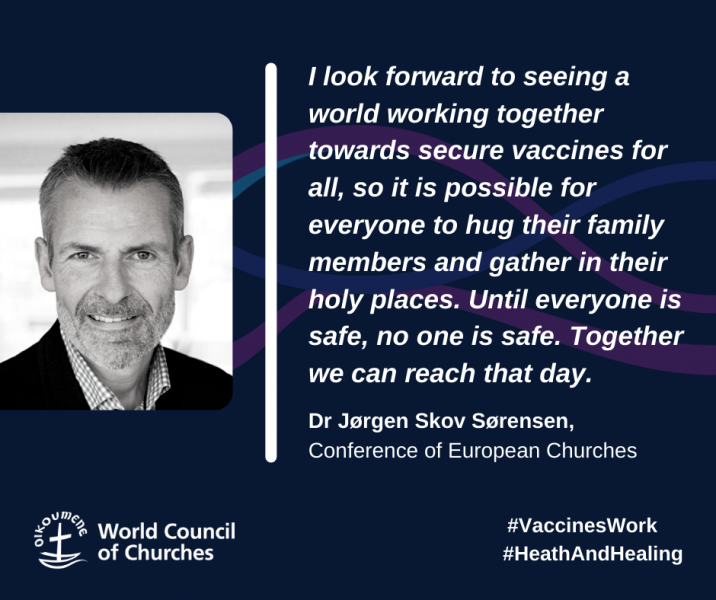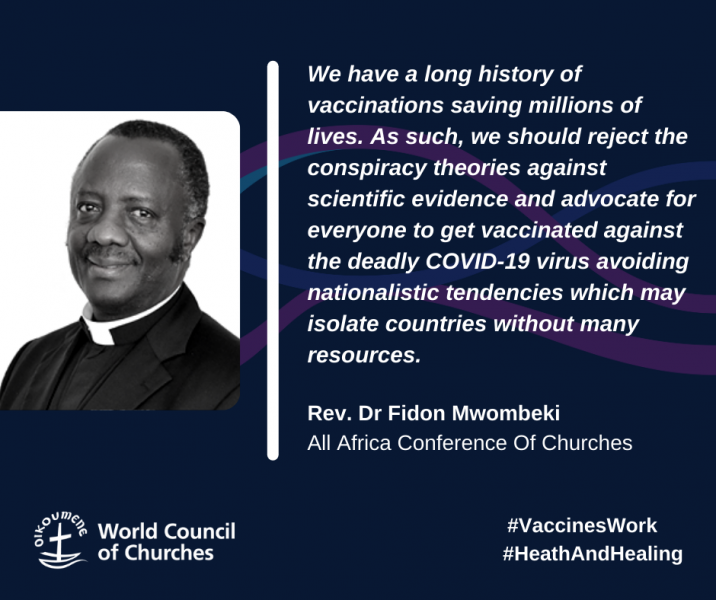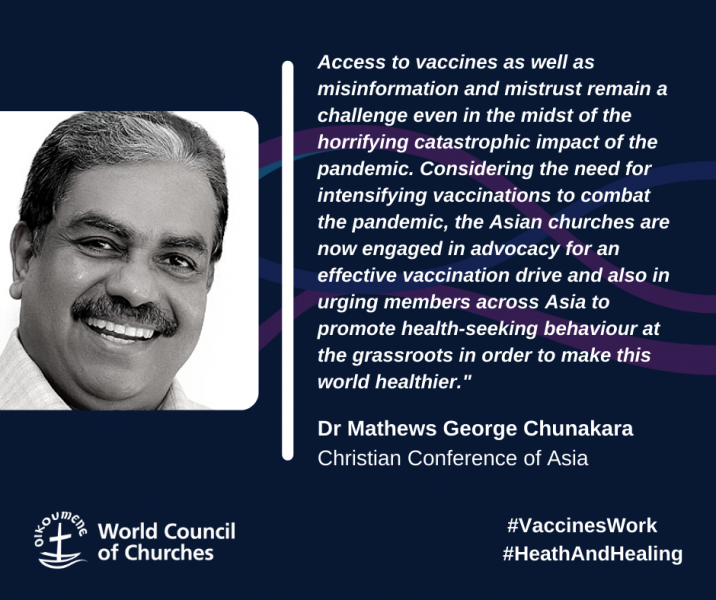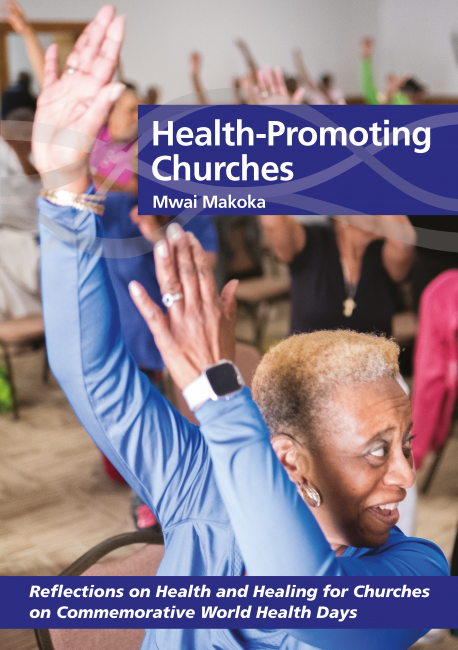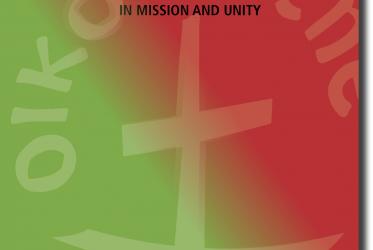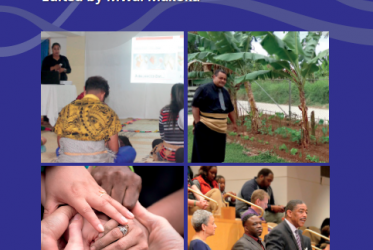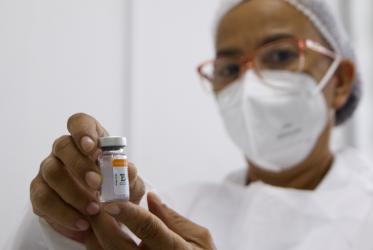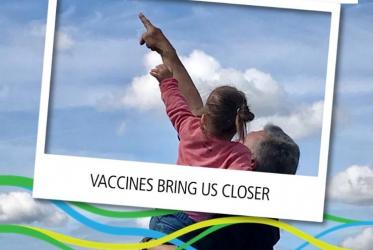Ressources COVID-19
Alors que nous devons nous tenir à distance les un-e-s des autres, il est aujourd’hui plus important que jamais de nous rapprocher spirituellement, dans la prière commune.
Voix de Lamentation, d’Espoir et de Courage
Vous composez des chants? Vous aimez écrire des prières? Découvrez comment vous pouvez apporter vos contributions à la spiritualité œcuménique!
Un ordre de prière matinale hebdomadaire
Tant que les prières en la chapelle du Centre œcuménique à Genève, où le COE a ses bureaux, soient suspendues, l’équipe dédiée à la spiritualité du COE partage, chaque semaine, une courte prière à lire individuellement (voir version en anglais du site).
-
Prières de la communauté du COE face au COVID-19
08 Avril 2021 -
-
-
-
-
-
De nombreuses congrégations à travers le monde doivent relever de nouveaux défis financiers à cause du COVID-19. Les fidèles doivent rester chez eux et nombreux sont ceux qui perdent leur emploi, luttent pour cultiver leurs terres, voire ne percevoir aucune aide du gouvernement. De nomsbreuses congrégations sont sollicitées pour de petits emprunts, les soupes populaires ou une aide matérielle. Les Églises du monde entier doivent trouver des manières créatives de lever des fonds pour couvrir ces dépenses imprévues.
L’Église luthérienne évangélique du nord-ouest de l’Afrique du Sud a organisé une Course en solitaire en solidarité avec l’Église à l’occasion de laquelle il était possible de parrainer un-e pasteur-e.
À Gujarat, en Inde, des jeunes femmes distribuent de la nourriture aux familles des travailleurs journaliers.
Réponse du pasteur Benjamin Simon, directeur de programme du COE pour les relations ecclésiales.
Équipe de soutien du COE face au COVID-19.
Connaissez-vous d’autres bonnes pratiques que vous aimeriez partager? N’hésitez pas à nous les communiquer à l’adresse [email protected]
En de nombreuses occurrences, la Bible nous montre Dieu invitant l’humanité à surmonter les crises en utilisant tous les outils à sa disposition. À nous de faire de même.
Utilisez les outils et ressources à votre disposition – y compris les services en ligne, les sermons et les études bibliques – pour communiquer votre volonté d’aider. Faites référence aux lignes d’assistance téléphonique ou aux réseaux de signalement par écrit. Créez et mettez en avant des espaces de dialogue en ligne et par écrit pour soutenir la vie de famille pendant la pandémie de COVID-19. Utilisez ces espaces pour discerner sur la ou les situation(s) existante(s) dans votre contexte et créez des codes SOS, au besoin. Réfléchissez à la manière de redéfinir concrètement les espaces de l’église (lorsque cela est possible) en des espaces de confiance pour les personnes ayant besoin de fuir.
Soutenez la campagne des Jeudis en noir du COE #ThursdaysinBlack pour un monde sans viol ni violence.
Comment faire Église lorsque les églises sont fermées?
Utilisez les ressources spirituelles publiées par le COE.
Réponse de la pasteure Nicole Ashwood, directrice de programme du COE pour une communauté juste pour les femmes et pour les hommes.
Équipe de soutien du COE face au COVID-19.
Connaissez-vous d’autres bonnes pratiques que vous aimeriez partager? N’hésitez pas à nous les communiquer à l’adresse [email protected]
La facilité avec laquelle les informations sont générées et diffusées nous a permis de partager des informations sanitaires fondamentales avec le plus grand nombre. Malheureusement, les mêmes outils sont utilisés pour diffuser des informations fallacieuses.
Vous devriez vous fier aux médias dominants pour les faits relatifs au COVID-19 puisque ceux-ci vérifient leurs sources. L’OMS et les organes régionaux sont également des sources fiables de données médicales. Tout traitement potentiel doit être soumis à des essais cliniques de référence. Il est dès lors jugé prématuré tant que cette étape n’est pas franchie et il est préférable de l’ignorer.
Nous ne devrions pas faire partie du problème. Soyez prudent-e-s et ne transférez des informations aux autres qu’après avoir vérifié leur pertinence et véracité.
Rendez-vous sur le site internet de l’OMS pour consulter les informations les plus récentes relatives au COVID-19.
Des conseils plus approfondis sur les «fake news».
La BBC propose un programme de vérification des faits, «reality check», pour dissiper les mythes.
Réponse du Dr Mwai Makoka, directeur de programme du COE pour la santé et la guérison.
Équipe de soutien du COE face au COVID-19.
Connaissez-vous d’autres bonnes pratiques que vous aimeriez partager? N’hésitez pas à nous les communiquer à l’adresse [email protected]
Le confinement chez soi et l’isolement des autres membres de la communauté, de l’école, des lieux de travail et des voisin-e-s augmente les risques de violence auxquels de nombreux enfants et adultes sont déjà confrontés. L’impact et le rôle joué par les responsables religieux pour leur venir en aide sont de plus en plus reconnus et documentés.
Rejoignez la campagne Faith in Action for Children (La foi en action pour les enfants) dont le but est de renforcer les efforts déployés pour garantir la sécurité des enfants pendant et après la pandémie de COVID-19.
Face au risque accru de violence sexuelle à l’égard des enfants pendant la pandémie de COVID-19, nous vous invitons à prendre connaissance de l’ensemble des Outils «Sortir de l’ombre» conçus par le COE pour les Églises.
Communiquez aux professeur-e-s de l’école du dimanche et du catéchisme les informations relatives aux numéros nationaux d’assistance téléphonique destinés à leurs élèves et sensibilisez aux conseils et ressources disponibles.
En cas d’absence de service de soutien dans votre pays: exhortez votre gouvernement et vos municipalités à en mettre en place. Si vous ne constatez aucun progrès, vous pouvez saisir le mécanisme de procédures d’urgence en matière de droits de l’homme des Nations Unies et revoir les mesures face au COVID-19 du Haut-Commissariat des Nations Unies aux droits de l’homme disponibles.
Réponse de Frederique Seidel, conseillère principale du COE pour les droits de l’enfant.
Équipe de soutien du COE face au COVID-19.
Connaissez-vous d’autres bonnes pratiques que vous aimeriez partager? N’hésitez pas à nous les communiquer à l’adresse [email protected]
Un accès sécurisé et constant à l’eau et aux produits d’hygiène et de nettoyage, de même qu’une politique de gestion des déchets sont essentiels pour prévenir toute transmission entre personnes du coronavirus. Or, la pandémie s’inscrit dans un contexte de crise mondiale de l’eau!
Quelque 2,2 milliards de personnes à travers le monde n’ont pas accès à l’eau potable, 4,2 milliards de personnes n’ont pas accès à des installations sanitaires sûres et elles sont 3 milliards à manquer d’infrastructures pour se laver les mains.
Cette année marque le 10e anniversaire de la reconnaissance par les Nations Unies du droit fondamental à l’eau potable et à l’assainissement pour tous et toutes. Cette pandémie lève encore plus le voile sur les injustices et inégalités existantes que nous devons encore contrer. Les Églises et agences associées œuvrent auprès des communautés pour lutter contre le manque d’eau en mettant à disposition, et en défendant l’accès à l’eau potable, abordable et en suffisance pour tous et toutes.
Le COE et ACT Alliance défendent la justice de l’eau à l’échelle internationale:
L’eau, l’assainissement et l’hygiène – la différence positive que peuvent faire les Églises (communiqué de presse du COE du 30 avril 2020, en anglais).
À travers ses programmes WASH (Eau, assainissement et hygiène), le volet humanitaire de l’Église norvégienne travaille avec les communautés et Églises locales pour faire une différence.
Enregistrement du webinaire «Lorsque la foi parle: WASH dans les institutions religieuses».
Réponse du Dr Manoj Kurian, coordinateur de l’Alliance œcuménique «agir ensemble», EAA-COE.
Équipe de soutien du COE face au COVID-19.
Connaissez-vous d’autres bonnes pratiques que vous aimeriez partager? N’hésitez pas à nous les communiquer à l’adresse [email protected]
Le COVID-19 a rendu la situation de la santé mentale plus difficile encore. Notre réponse ecclésiale ne devrait pas se limiter au bien-être spirituel de la personne, mais considérer son bien-être holistique, et notamment la santé mentale. Identifiez dans votre Église un-e professionnel-le de la santé mentale accrédité-e capable d’offrir un espace de confiance pour dialoguer et accompagner le bien-être mental. Vous pouvez également solliciter une aide professionnelle en nouant un partenariat avec des organisations à but non lucratif. Pour créer un espace de formations ou d’ateliers sur la réponse à la santé mentale, le Mental Health First Response (MHFR, Première réponse en santé mentale) peut vous aider.
Informations sur la stigmatisation silencieuse de la maladie mentale dans l’Église.
Vous pouvez également consulter le discours de la secrétaire générale adjointe du COE, Isabel Apawo Phiri, à l’occasion de la Journée mondiale de la santé mondiale en 2016.
Réponse de Joy Eva Bohol, directrice de programme du COE pour l’engagement des jeunes.
Équipe de soutien du COE face au COVID-19.
Connaissez-vous d’autres bonnes pratiques que vous aimeriez partager? N’hésitez pas à nous les communiquer à l’adresse [email protected]
En décidant d’être présentes en ligne, les Églises ont donné la priorité à la programmation du culte dominical – ce qui est tout à fait indiqué! Néanmoins, nous ne devrions pas oublier les jeunes de nos congrégations. Il est important de maintenir le lien entre eux, mais aussi avec la communauté religieuse au sens large. Comment faire?
Envisagez d’organiser, lorsque cela est possible, des séances en ligne du modèle Alpha Jeunes sur la plateforme Zoom, pour ne citer qu’un exemple parmi d’autres.
Ou alors, pourquoi ne pas utiliser les vidéos et la plateforme TikTok pour entrer en contact avec les jeunes? À l’occasion de la fête des Mères, une paroisse a tourné des messages vidéos sur WhatsApp avec des pasteur-e-s utilisant des marionnettes pour communiquer avec les enfants et les jeunes de la paroisse.
Vous trouverez un exemple d’école biblique en vacances destinée aux enfants pendant le confinement dans la vidéo CSI All Souls’ Coimbatore.
Réponse du pasteur Mikie Roberts, directeur de programme du COE pour la vie spirituelle et Foi et constitution.
Équipe de soutien du COE face au COVID-19.
Connaissez-vous d’autres bonnes pratiques que vous aimeriez partager? N’hésitez pas à nous les communiquer à l’adresse [email protected]
Les petites communautés insulaires jouissent souvent d’un bon réseau social et d’un bel esprit communautaire. Or, il arrive que des soins hospitaliers de haut niveau demandent une évacuation par avion ou par bateau vers l’hôpital le plus proche sur le continent, et cela peut s’avérer plus difficile, voire impossible, pendant la pandémie de COVID-19. Les Églises ont un rôle crucial à jouer pour maintenir la communication, diffuser des informations précises, remonter le moral et veiller sur la santé mentale des membres de la communauté.
Sur l’île de Man (un territoire britannique autonome qui ne fait pas partie du Royaume-Uni), il a été décidé d’interdire strictement l’entrée. Les Églises locales mettent en place des ressources en ligne (y compris des cultes) adaptées aux circonstances locales, telles que le projet «Sthie» (prononcez «staï»).
De nombreux petits États insulaires en développement du Pacifique n’ont pas d’installations médicales adaptées ni les ressources pour lutter contre le COVID-19. De nombreuses personnes souffrant de pathologies préexistantes sont toujours à haut risque.
Les Églises des îles du Pacifique, sous la houlette de la Conférence des Églises du Pacifique, ont pris des mesures telles que des cultes en ligne et des cultes à la maison/en famille, en sensibilisant aux mesures de précaution. Actuellement, les Églises travaillent à la création de potagers «banques alimentaires» pour nourrir les familles à revenus modestes ou en difficulté.
Réponse du pasteur Matthew Ross, directeur de programme du COE pour la diaconie et le renforcement des capacités.
Équipe de soutien du COE face au COVID-19.
Connaissez-vous d’autres bonnes pratiques que vous aimeriez partager? N’hésitez pas à nous les communiquer à l’adresse [email protected]
The COVID-19 pandemic requires all of us to stay physically distanced. We have to reorganise our daily lives and also our spiritual lives. This is very intensive and time consuming. But, it is not about being socially distanced – it is rather very important that we remain socially connected in one way or the other. This is also the case with our spirituality and church life. Ecumenical relations are also important in view of learning from each other and improving our own situation as well as working on the unity Christ motivated us to pursue.
The WCC has collected a database of materials from its worldwide fellowship and partners where good practices are collected (https://oikoumene.photoshelter.com/galleries/C00007cp7smNqBk0/Corona-FellowshipContent). The WCC has recently opened this database to all.
Some ecumenical initiatives try to bring together partners from all over the world. Check out the Global Ecumenical Hangout
Some ecumenical gatherings are inviting people to share prayers or common songs. The Christian Conference of Asia, for example.
Response by Rev. Dr Benjamin Simon, WCC programme executive for Church Relations WCC COVID-19 Support Team
Do you know about more good practices to share? Please feel free to let us know at [email protected]
Churches play an important role in supporting children whose challenges are exacerbated by the COVID-19 crisis.
Sunday school facilitators and teachers of church-run schools are well placed to keep in contact with the children in their communities, provide spiritual support, share educational, protective and entertaining resources adapted to confinement, and let them know where to find help if they are at risk.
Check out the UNCEF COVID-19 information centre
Some churches were able to develop child-focused COVID-19 resources, such as the puppet web series for the youngest ones, developed by the Anglican church in Canada.
Churches can access and share support materials through the Faith for Positive Change for Children initiative, for which WCC is an Advisory Group member.
You can also help children see the opportunity for lasting systems changes in the COVID-19 crisis, and encourage them to participate in building back better.
Response by Frederique Seidel, WCC senior advisor on child rights WCC COVID-19 Support Team
Do you know about more good practices to share? Please feel free to let us know at [email protected]
Worldwide, 71 million people are refugees or are displaced within countries. Living in cramped circumstances, with limited access to resources, hygiene and health facilities, they are particularly at risk during this pandemic. Over 80 percent of the world's refugees are hosted in low- and middle-income countries, many of whom are facing multiple challenges of their own. In these difficult times, there are instances where refugees and migrant populations are blamed by host communities for bringing the pandemic, precipitating further stigma and persecution.
The pandemic is leading to a severe economic downturn, making the mobilisation of resources for the welfare of displaced people and refugees more difficult.
This is the time when churches and faith communities are to be in solidarity with the most vulnerable communities today.
In the middle east, the council of churches is supporting displaced families with personal protection equipment and support for their livelihood.
In Europe, the Churches’ Commission for Migrants in Europe is actively advocating at the political level for the rights of migrants, refugees and displaced people to ensure their right to protection, just treatment and human dignity.
Response by Dr Manoj Kurian, coordinator of the WCC-Ecumenical Advocacy Alliance WCC COVID-19 Support Team
Do you know about more good practices to share? Please feel free to let us know at [email protected]
The number of people facing acute food insecurity is expected to rise to 265 million in 2020, from 135 million in 2019, as a result of the impact of COVID-19.
More than 60% of the world's workforce, accounting for 2 billion workers, are in informal employment. Most of them do not have access to the social safety-net, adding to their vulnerability in accessing food. The long lines of people waiting for food assistance has become a familiar sight even in the wealthiest nations of the world. A day without work often translates to a day without food.
Churches all over the world are at the forefront of responding and accompanying those who are in need, serving and witnessing the Lord by their actions.
The Anglican Communion of Churches
The National Council of Churches in India
The Presbyterian Church in the USA
Response by Dr Manoj Kurian, coordinator of the WCC-Ecumenical Advocacy Alliance WCC COVID-19 Support Team
Do you know about more good practices to share? Please feel free to let us know at [email protected]
Now is the opportune time for us to learn from those in the margins. The stories of resilience and solidarity around the world expose, more than ever, the disparities of our society. People are now re-awakened and are more eager to address climate justice, gender justice, and economic justice, among other issues.
There are young people from different countries, who continue to #protestfromhome to demand accountability of governments to put human rights at the center of the COVID-19 response.
Young women ambassadors of Thursdays in Black campaign continue to raise awareness and demand for change towards a world without sexual and gender-based violence.
A youth group in India distributes food and hygiene kits
#ProtestFromHome: Why Christian youth go on ‘digital protest’ amid lockdown
Response by Joy Eva Bohol, WCC programme executive for youth engagement WCC COVID-19 Support Team
Do you know about more good practices to share? Please feel free to let us know at [email protected]
Now that attending church in-person at the sanctuary is limited, the church should take this as an opportunity to reemphasize our service with our neighbours. In many cases around the world, healthcare workers and other essential workers in the frontline are discriminated due to their direct exposure to the people infected with coronavirus. Many of them were kicked out of their apartments. The church can offer our places of worship to these frontline workers as temporary refuge.
Philippine church leaders say churches can serve as field hospitals
Religious groups, churches offer temporary shelter for COVID-19 frontliners
Response by Joy Eva Bohol, WCC programme executive for youth engagement WCC COVID-19 Support Team
Do you know about more good practices to share? Please feel free to let us know at [email protected]
COVID-19 continues to challenge society, with the hardest hit being the vulnerable members. Governments, experts and religious leaders have put in place emergency measures as well as social and economic safety nets as a response to the pandemic. The church, which has a unique role of offering societal support, comfort and guidance has also set up response measures to complement efforts of other actors.
Emerging evidence shows that persons with disabilities—among other vulnerable persons—are being disproportionately affected by the pandemic. Persons with disabilities are at the risk of greater socio-economic impact due to attitudinal, environmental and institutional barriers that are reproduced in the COVID-19 response.
In most societies, the church is perceived as a source of credible information and can influence the actions of other actors in the society. The church can use this position to influence a disability inclusive response to COVID-19 through:
Provision of accessible information.
Accessibility of health services and medical equipment.
Inclusion of persons with disabilities in the emergency response initiatives.
Assurance that worship, pastoral and other forms of spiritual support take into the account the unique needs of different types of disabilities.
Links for more information:
Advancing a disability-inclusive response to COVID-19
UNSDG - Policy Brief: A Disability-Inclusive Response to COVID-19
Ecumenical Disability Advocates Network (EDAN)
Response by Anjeline Okola, programme coordinator, WCC Ecumenical Disability Advocates Network
WCC COVID-19 Support Team
Do you know about more good practices to share? Please feel free to let us know at [email protected]
In many cultures worldwide, people are used to living very close to each other by keeping a strong sense of social and physical connectedness and conviviality—especially in times of sorrow and grief. This is something genuinely human and important for the well-being of a human being. In these times of COVID-19, we are asked exactly the contrary – keep distanced! Stay physically distanced. This is not to be misunderstood as staying socially distanced. It is not needed to stay socially distanced in this pandemic. Many ways are given to stay socially connected while keeping a physical distance, even in societies and cultures where this is lived out intensively. It is important that we accept that a change in our behaviour is essential.
Close ties challenge rural Africa
Behavioural changes difficult
Some guidance amidst COVID19
People drew closer to WCC fellowship
Response by Benjamin Simon, WCC programme executive for Church Relations
WCC COVID-19 Support Team
Do you know about more good practices to share? Please feel free to let us know at [email protected]
The first of June through 30 November is designated as hurricane season in the Atlantic Basin. Emergency managers have begun preparation for this above-average 2020 hurricane season by amending all predesigned hurricane response and recovery plans to include new guidance to mitigate the spread of the coronavirus.
As it relates to physical distancing, personal protective equipment, and external support, some key areas of concern were raised:
Maintaining newly adopted telecommunication platforms for emergency operation and recovery centers.
Identifying, staffing and equipping additional emergency, long-term and medical sheltering.
Arranging transportation and alternate mainland medical facilities for patient evacuation.
Managing resource staging and distribution to minimize personal contact.
Obtaining direct federal aide and mission assignments with mainland states.
As the number of positive affected individuals increases, it is evident that normal measures for disaster response and recovery will not be enough to safeguard all those engaged in the relief efforts. Early Identification of available resources and entering pre-position contracts, memorandums of agreement and pre-scripted mission assignments must be accomplished to reduce the territory’s shortfalls.
Preparing for Hurricanes During the COVID-19 Pandemic
Pastoral letter from the general secretary of the Pacific Conference of Churches
Response by Rev. Debra Henneman-Smith, an acolyte of the Memorial Moravian Church in St Thomas, US Virgin Islands
Do you know about more good practices to share? Please feel free to let us know at [email protected]
Deforestation and forest degradation continue to take place at an alarming rate, contributing significantly to the ongoing loss of biodiversity and increasing human vulnerability to emerging pandemics. Over the last 30 years, approximately 60-70 percent of new diseases that emerged in humans had an animal origin. Three to four new infectious diseases emerge each year, most of which originate from wildlife.
As the COVID-19 virus spreads around the world, deforestation is also rising at an alarming rate. Indigenous people are being killed, exploited and expelled from their lands. The welfare of the indigenous people who constitute 5 percent of the world’s population is critically linked to the very survival of humanity.
By respecting and conserving forests, we protect both the diversity of creation, and indigenous people, who are guardians of creation. We also protect ourselves from deadly new diseases.
WCC is part of the global faith-based movement, the Interfaith Rainforest Initiative, to inspire people, appeal to their core values, and make an ethical case for urgent and concerted action to protect rainforests.
WCC - part of the global faith-based movement, the Interfaith Rainforest Initiative
Learn more about the Interfaith Rainforest Initiative
The Resource Guide on Rainforest Protection for Religious Communities
FORESTS AND PANDEMICS: An issue primer for religious leaders and faith communities
WCC- Solidarity with Indigenous Peoples
Response by Dr Manoj Kurian, coordinator of the WCC-Ecumenical Advocacy Alliance
WCC COVID-19 Support Team
Do you know about more good practices to share? Please feel free to let us know at [email protected]
After months of lockdown and engaging in virtual worship, congregations throughout the world are preparing to gather again in their sanctuaries. In keeping with the guidelines that many countries made, churches and other places of worship were all impacted.
Now as these restrictions are eased, congregations are once again seeking to navigate the return of worship in their church buildings. In this process, they are once again being guided by protocols that have been established by governmental health agencies. These protocols cannot be ignored, for that would mean risking the health and wellbeing of members within the same congregations and the wider community.
In returning to physically gathering for worship, congregations have also had to discern how best to follow these protocols while ensuring that the core elements of their liturgical practices are not cast aside. Some ecumenical guidelines have been created which provide some insightful ways that congregations can navigate the delight and challenge that comes with returning to the familiar space of their sanctuaries.
Singing, a source of healing and hope
Singing in midst of several global “pandemics” including Racism
Pandemic challenges music ministers
Response by Rev. Dr Mikie Roberts, WCC programme executive for Spiritual Life and Faith and Order
WCC COVID-19 Support Team
Do you know about more good practices to share? Please feel free to let us know at [email protected]
COVID-19 resulted in an unprecedented surge in domestic violence. Many postulate that this results from the mental health implications of being under lockdown and the uncertainty that accompanies the economic fallout; and this is correct. However, it is important to note that COVID-19 has only served to exacerbate the underlying problem of patriarchy (the abuse and misuse of power dynamics especially between men and women). The refusal of some governments to institute programmes for the protection of women and girls from sexual and gender-based violence, the lack of access for young mothers to post-pregnancy education, the increased cases of infection risk, unemployment (especially in the informal sectors) and economic support point to patriarchy’s influence on the domestic violence and gender inequalities. One may presume, in the absence of empirical data, that patriarchy, mental health challenges and opportunity have jointly influenced the surge in violence during the pandemic.
Resources which point to patriarchy as a pre-existing condition for violence during COVID-19:
Policy Brief: The Impact of COVID-19 on Women
The Diplomat: How COVID-19 Worsens Gender Inequality in Nepal
The Shadow Pandemic- GUIU’s Response to Gender-Based Violence During COVID-19
World Bank: Gender Dimensions of the COVID 19 Pandemic
Response by Rev. Nicole Ashwood, WCC programme executive for Just Community of Women and Men
WCC COVID-19 Support Team
Do you know about more good practices to share? Please feel free to let us know at [email protected]
God speaks to God’s people through many mediums. Some of the ways through which Christians can hear the voice God are by observing nature, reading God’s word or reflecting on personal experiences through the spirit of God.
Reflecting on Jeremiah 29:1-13 provides some insights that may help Christians as they struggle to discern the voice of God amidst the many voices claiming to be God’s voice.
It is important to use reason in listening to God because God is not irrational. In times of crisis like the current pandemic, our responses can alleviate or aggravate suffering. Working to understand the virus, how it is transmitted, how it can be prevented and how it affects human bodies would be helpful in mitigating the suffering. It is important therefore to hear the voice of God in those lines in which life will be affirmed and suffering will be alleviated.
Realistic Hope, Not False Hope: Prophecy and COVID-19
Response by Rev. Pauline W. Njiru, WCC Ecumenical HIV & AIDS Initiatives & Advocacy Eastern Africa regional coordinator
Do you know about more good practices to share? Please feel free to let us know at [email protected]
The pandemic has heightened existing inequalities and vulnerabilities, further exacerbating current inadequacies within systems and infrastructures. Indigenous communities lack adequate access to healthcare systems, financial and social services. The pandemic has made access to these services even more difficult. Language and communication are an additional barrier in a time of critical need as information about the pandemic or access to services is not usually translated into indigenous languages. For many indigenous communities, COVID-19 not only poses a continuing health threat but also more critically threatens their very survival and existence. The pandemic affects the elderly and those with pre-existing medical conditions. The loss of the elderly or indigenous elders inevitably means a loss of culture. The lockdown has meant a loss of income and livelihood. In some countries, unfortunately, governments are taking advantage of the pandemic to further exploit and oppress indigenous communities.
As difficult and as challenging the pandemic has been for indigenous communities, they continue to rise in hope and resilience, offering encouragement, wisdom and a vision of world where all can continue to live sustainably, equitably, and justly.
Indigenous Elders write to the church on COVID-19
Impact of COVID-19 on Indigenous communities across the globe
UN - COVID-19 and Indigenous peoples
Protect the people of the Amazon during COVID-19, urge Norwegian church leaders
Responses by Rev. Dr Seforosa Carroll, WCC programme executive, Mission from the Margins/Indigenous Peoples
Do you know about more good practices to share? Please feel free to let us know at [email protected]
Among the people most affected by the isolation imposed because of the coronavirus are persons with disabilities and it’s therefore important that in the midst of it all, we need to be cognisant of the rights of persons with disabilities in relation to the COVID-19 response and accompany them during this period. One of the key ways in which we can accompany persons with disabilities is to ensure that all preparedness and response plans are inclusive of and accessible to all persons with disabilities, including women and girls with disabilities, and that they receive information about infection mitigating tips, public restriction plans, and the services offered in a diversity of accessible formats, including: easy-read format; high contrast print and, where possible, braille; and use of available technologies such as subtitles in verbal messaging.
Second, in the event of a quarantine, support services as well as physical and communication accessibility must be ensured. Personal assistants and interpreters should be, when possible, proactively tested for COVID-19 to minimize the risk of spreading the virus to persons with disabilities. If a person with disabilities ends up being infected with the virus, this could lead to increased barriers in seeking and receiving healthcare and it is therefore important to ensure that they do not experience discrimination and negligence by healthcare personnel.
Finally, we need to have understanding and show love for one another.
Lutheran Disabilities Services
Coronavirus Resources for Churches
Response by Anjeline Okola, programme coordinator, WCC Ecumenical Disability Advocates Network
WCC COVID-19 Support Team
Do you know about more good practices to share? Please feel free to let us know at [email protected]
Power can be defined as the ability or capacity to direct or influence the behaviour of others or the course of events. In the context of the COVID-19, there are key three facets of power that influence the trajectory of the pandemic: The power that comes through the authority to govern; the power that comes from wealth and the access to resources; and the power that comes from being able to influence the thinking and actions of people—such as religious and spiritual leaders wield.
It is the way power is exercised that determines a good or bad outcome.
In exercising power positively, authorities adhere to scientific evidence, looking beyond consolidating political control and by being accountable to all sections of their population.
Wealthy nations, representing only 13 percent of the world's population, have exercised their economic power by reserving 51 percent of the promised doses of leading COVID-19 vaccine candidates. As the scramble for vaccines intensifies, two-thirds of the world's population may not have a vaccine until 2022. Nevertheless, there are positive signs: 30 countries and many international partners have committed to support the COVID-19 Technology Access Pool, an initiative aimed at making vaccines, tests, treatments and other health technologies to fight COVID-19 accessible to all.
It is also clear that faith communities are protected from the pandemic when religious and spiritual leaders and institutions exercise their power and influence over people by pointing to trustworthy and scientific information and combatting false information, ignorance and fear.
Only the power of love and mutual accountability will overcome SARS-CoV-2.
Recommendations for religious leaders and faith-based communities in the context of COVID-19
'The Covid-19 Global Response Index'
Half the future supply of leading COVID-19 vaccine contenders bought up by a few wealthy nations
COVID-19 Technology Access Pool to ensure the latest and best science to benefit all of humanity
Response by Dr Manoj Kurian, coordinator of the WCC-Ecumenical Advocacy Alliance
WCC COVID-19 Support Team
Do you know about more good practices to share? Please feel free to let us know at [email protected]
Worldwide, as of 26 September 2020, almost one million people have died from COVID-19. Every death is a human tragedy, resulting in grief, bereavement and – in some cases – loss of family income. The mental health implications for those who have lost a loved one cannot be underestimated; pastoral care and diaconal support may be necessary for many years. Adequate resourcing of diaconal services will be crucial to meet needs.
Hospitals will often need to restrict access to COVID-19 patients. This has led to many deaths alone, where a family has been unable to say goodbye. There may be restrictions on funerals, such as numbers of mourners who may attend. Such issues can compound grief. In such cases, as well as grief, death can also be accompanied by feelings of guilt amongst survivors. Questions, such as whether more could have been done to prevent the death, are commonplace. In all cases, stigmatisation of victims of COVID-19 is wrong and misguided. Bereaved relatives thus require particular support and understanding.
Whilst the majority of deaths have been amongst the elderly, younger people (including children) are not immune. Any trivialisation or downplaying of the consequences of COVID-19 is highly irresponsible and can lead to increased infection rates; the church can play a key role in addressing superstitions, rumours and falsehoods.
How coronavirus has transformed the grieving process
“I buried my cousin live on facebook”
“I believed that I would see her again”
Response by Rev. Matthew Ross, programme executive for Diakonia and Capacity Building
WCC COVID-19 Support Team
Do you know about more good practices to share? Please feel free to let us know at [email protected]
Liturgical practices vary depending on ecclesiastical traditions. However, one common element of living, praying and worshipping is that it is done in community. Christian faith is embodied through presence. When we speak of presence, the discussions tend to emphasize the theological understanding of the spiritual presence of God or the confessional thinking on the presence of Christ in the celebration of sacrament of Holy Communion. However, the COVID-19 pandemic has caused us to consider just how important our human presence is to each other in our faith community.
But how can our faith communities maintain a connection with these spiritual tributaries during a pandemic—when for the safety of all in the community one’s absence is more encouraged that one’s presence? The receiving of rites and sacraments involve the physical presence and engagement of laity and clergy together in community. Whether we are referring to acts of Christian initiation which welcome one into the Body of Christ (baptism), or those which affirm one’s continued faith growth (confirmation) or at the moment of death (last rites) physical presence is preferred over the virtual.
Church authorities are now seeking to provide ecclesial and pastoral guidelines. The COVID-19 pandemic has underscored the value and necessity of these practices to our living and being in faith community.
Guidance for Funeral practices
Communion precautions
Response by Rev. Dr Mikie Roberts, WCC programme executive for Spiritual Life and Faith and Order
WCC COVID-19 Support Team
Do you know about more good practices to share? Please feel free to let us know at [email protected]
In functioning democracies, regular elections are the essential means of ensuring that governments remain accountable and responsive to the people they govern. However, given that they are also very large social events, they obviously entail significantly increased public health risks in the context of the COVID-19 pandemic. On the other hand, postponing or cancelling elections during this period also carries serious risks for democratic accountability, with some leaders only too happy for an excuse to extend their power beyond normal constitutional limits.
Authorities who are genuinely seeking to balance these countervailing risks must consider a number of factors on a case-by-case basis, including:
—Constitutional restrictions or flexibilities regarding the scheduling of elections;
—The nature and severity of the pandemic in that particular context;
—Whether alternative means of voting can be made available, especially to people with special vulnerabilities, and
—Whether sufficient resources are available to ensure that voters, officials and staff can be adequately protected from transmission and infection.
But despite the challenges involved in holding elections during the pandemic, the decision to postpone an election should never be taken lightly. An emergency situation such as a pandemic serves as a test of the quality of the social contract between citizens and their government. It is exactly in such a context that democratic accountability becomes even more important.
Council of Europe: guidance and best practice on holding elections during the pandemic
USA CDC: Considerations for Election Polling Locations and Voters
Lessons from elections in Liberia in 2014 during the Ebola crisis
Elections in a pandemic: Lessons from Asia
Response by Peter Prove, director, WCC Commission of the Churches on International Affairs
Do you know about more good practices to share? Please feel free to let us know at [email protected]
The enforced closing of educational institutions in most countries because of the pandemic has had a ripple effect in most sectors. Subsequently, for many the call for return to the normal ordering of school life is welcome. However, the transition from the brick and mortar classroom to students learning from home has impacted our lives in so many ways. The presence of COVID-19 has undoubtedly brought about many challenges but it has also brought some opportunities for change and growth. Here in the US Virgin Islands, schools were ordered closed in March for three weeks. But months later, as schools remained closed, fear started to set in as parents and educators became increasingly concerned about: finding childcare, securing their jobs, learning loss, protecting their families from the virus, and the future of the world. Now, more than ever, it is so important to find silver linings. Our schools have jumped ahead 50 years with the new technology, educational platforms and trainings that were offered to our teachers and members of the faculty and staff. As people of faith, we affirm that “this too shall pass!”
Belarus Church responds to schools needs
Tragic consequences of school closures in Kenya
Virgin Islands – Guide to Reopen Public Schools
Response by Stefan Jürgen, PhD, superintendent of Schools, St Thomas/St John School District
Do you know about more good practices to share? Please feel free to let us know at [email protected]
Indigenous communities occupy 20-25% of the Earth’s land surface, and 80% of that land mass holds the world’s remaining biodiversity. Indigenous peoples and communities embody the wisdom of many centuries. They have been and still are caretakers of the land and ecosystems, understanding the delicate relational interconnectedness between the Creator, Creation and people. The COVID-19 crisis has revealed what indigenous people have been telling the world for so many centuries. They have forewarned that the failure to protect our ecosystems and nature’s biodiversity will lead to a major crisis. The pandemic is an example of how the excessive and misuse of the earth’s resources affect the well-being and health of all creation, people included. Indigenous communities have a deep affiliation and connection to the earth, understanding the importance of living sustainably with creation and with each other. Indigenous communities have knowledge of traditional healing and medicines to treat sickness and disease, which some communities have been using to treat COVID-19 as many indigenous communities still do not have access to healthcare. Indigenous people give our faith communities the gift and wisdom of their indigenous spiritualities that value the interconnectedness of life between Creator, Creation and interdependent relationships. Indigenous people have a critical role in shaping the way forward toward a hopeful post-COVID, post-growth and post-fossil fuel future. Indigenous voices, perspectives, and wisdom are crucial for influencing change and reimagining a new and sustainable future for the whole of creation.
What indigenous people have been saying thousands years
First Peoples connections too strong to sever
WCC honors worlds indigenous communities
Indigenous peoples voices from the ground at the HLPF2020
Responses by Rev. Dr Seforosa Carroll, WCC programme executive, Mission from the Margins/Indigenous Peoples
Do you know about more good practices to share? Please feel free to let us know at [email protected]
Racism has been an ongoing topic and concern in churches and the ecumenical fellowship since the establishment of the WCC in 1948. During the South African struggle, churches addressed the issue of apartheid. Although the churches were divided on the theological nature of apartheid, for the ecumenical movement they took a stand and denounced racism as a sin. As we read the signs of our times, racism and actions to overcoming it in the church and society have come to dominate the news. Racism and xenophobia are experienced, for example, by Dalits, indigenous people, Blacks and people of African descent all over the world. One of the most recent reactions to the global manifestation of racism is the Black Lives Matters movement. We must be vigilant to the changing faces of racism. Christians and people all over the world are still facing this challenge. And even, if it is not a popular topic, especially if it is amongst our own Christian constituencies, we must deal with it. For the ecumenical movement and all its member churches it should be self-evident that “every form of racism, also in their own life is contrary to the Word and will of God.” (Common Understanding and Vision, (CUV-Document).
Webinar on Racism, Xenophobia and discrimination in the Asian context
Regional webinar – Latin America and Caribbean
Webinar on Racism, Xenophobia and discrimination in the Pacific context
Webinar on Racism, Xenophobia and discrimination in the Middle East
Webinar on Racism, Xenophobia and discrimination in Africa
Grappling with how racism coexists with faith:
Response by Benjamin Simon, WCC programme executive for Church Relations
WCC COVID-19 Support Team
Do you know about more good practices to share? Please feel free to let us know at [email protected]
Many governments have taken extraordinary measures to control and reduce the pandemic, many of which impinge heavily on people’s daily lives and livelihoods. These restrictions have in some cases provoked strong opposition and complaints about what some see as human rights violations.
Except in the case of certain core – or ‘non-derogable’ – human rights (such as the right to life, the prohibition of torture and other cruel, inhuman or degrading treatment or punishment, and the prohibition of slavery – and probably also key subsistence rights inherently related to the non-derogable right to life, such as food, housing, and clean water), international human rights law generally allows for governments to derogate from human rights obligations during public emergencies, so long as the measures taken are necessary, proportionate, for the purpose of promoting the general welfare in a democratic society, time-bound, and applied in a non-discriminatory way.
In the context of the COVID-19 pandemic, such emergency powers must be used for legitimate public health goals, NOT for the purpose of quashing dissent or silencing the work of human rights defenders or journalists.
It is important to note that restrictive public health measures, including quarantines, have increased exposure to gender-based violence, particularly intimate-partner violence and domestic violence. Therefore, support services and safe shelters for victims of gender-based violence need to be maintained in order to mitigate against such consequences.
For more guidance on human rights and the COVID-19 pandemic
COVID-19: A Human Rights Checklist, by Human Rights Watch
Protecting Children’s rights
Protection and Promotion of Human Rights in the Philippines
Response by Peter Prove, director, WCC Commission of the Churches on International Affairs
Do you know about more good practices to share? Please feel free to let us know at [email protected]
It is perceived that more people are now available on their gadgets during the COVID-19 pandemic period than at any other time. In a bid to self-distance, working, studies, shopping and even worship happen online.
If the church needs to be active online, this has been the perfect time. Hence, advocacy on climate justice by the church can reach more people now.
In Kenya, the Green Anglicans Movement has been carrying out campaigns on social media and directly involving congregants through personalized media packs to encourage both young and old to take a stand and take action. Most recent campaigns are “Season of Creation online” challenges and the “I am A Green Anglicans champion” campaign.
We have seen a huge turnout to online events with great feedback from people inquiring of how best to take action and get involved. This has challenged communication's teams to create simple and precise content to pass as much information as possible in the simplest language possible.
As we gradually set into the new normal, we are holding the momentum by urging dioceses and church leadership generally to mobilize congregants to carry out simple exercises to care for creation such as sustainable tree growing and community cleanups among others whilst observing Ministry of Health regulations.
Prophetic voices of young people
Webinar series: Churches on the Road to an economy of life and ecological justice
Biodiversity an urgent existential issue - Churches in Actions
Response by Irene Sebastian Waweru, volunteer, Green Anglicans Movement Kenya. Do you know about more good practices to share? Please feel free to let us know at [email protected]
The World Health Organization indicates that there are over 200 vaccines in development, some of which are already in advanced stages, with the hope that one or more of them will succeed and receive the approval from medical regulators soon. Once a vaccine is available, they say priority will be given to frontline workers and people at high risk, such as the elderly.
Once a vaccine is available, we can expect some dynamics on the ground. Not everyone who receives a vaccine will develop the immunity, especially those who already have suppressed immune systems. As Christians, we need to continue praying for a speedy discovery of a safe and effective vaccine, and that vaccine availability shall be guided by values of equity and the Sustainable Development Goals ethos of leaving no one behind.
For a biblical reflection on immunisations, see pages 20-23 of Health-Promoting Churches
More information on progress on covid vaccines
When can we expect a vaccine for COVID19? (WHO response)
Response by Dr Mwai Makoka, WCC programme executive for Health and Healing
WCC COVID-19 Support Team
Do you know about more good practices to share? Please feel free to let us know at [email protected]
Le COE répond à vos questions sur les vaccins
Vaccine Champions
Since the World Immunization Week, nine church leaders from different continents are assuming their roles as Vaccine Champions. They joined a team of 300 specially assigned Vaccine Champions, mobilized by UNICEF, to raise awareness on the benefits of immunization. World Immunization Week is a yearly event organized by UNICEF, bringing together key health organizations and others, such as the WCC, to raise awareness on the benefits of immunization. Although the COVID-19 pandemic remains a major challenge, there are several other immunization issues to address.
The WCC team include the following church leaders, who also share their thoughts and reflections on their task and the current situation:

Rev. Prof. Dr Ioan Sauca, Switzerland, WCC acting general secretary
“As COVID-19 vaccination programmes are being rolled out, religious leaders of all faiths play a critical role in sustaining public trust in health authorities and services, as well as in the approved vaccines themselves. As a Christian fellowship, it is our duty and moral obligation to publicly challenge rumours and myths and confront them with facts. While moral and ethical concerns also loom over vaccine access and distribution practices, we must take up responsibility and advocate for what is right from a medical, ethical and human rights perspective.”
Rev. Gloria Ulloa Alvarado, WCC president for Latin America and the Caribbean
“Vaccination is important,
Because people who receive the vaccine can approach their loved ones with more confidence, without fear of infecting them or being infected.
Because those who work in healthcare and education can do their work with their patients and students in a less stressful environment.
Because I understand that the COVID-19 vaccine helps protect the human body by creating an antibody-generating response.
Because human history has shown us the effectiveness of vaccination.
Because my mother Noemi, who is 94 years old, has already received two doses of the vaccine and has had no negative effects on her body, she has not had any type of discomfort and this has brought great peace of mind to our whole family.“
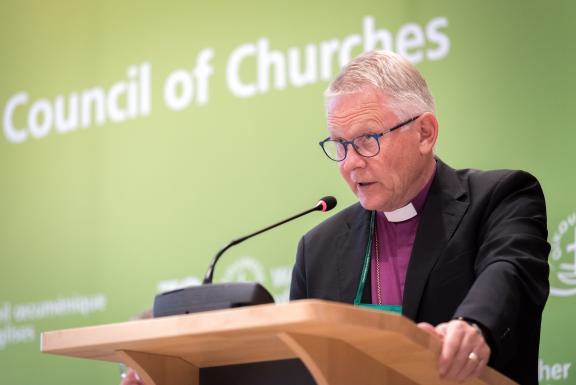
Archbishop emeritus Dr Anders Wejryd, Sweden, WCC president for Europe
“Do to others what you want them to do to you! And don’t do what you don’t want them to do to you! I don’t want to be infected by COVID-19 and I absolutely don’t want to be the one that brought the infection on to someone else. Therefore vaccination is simply about solidarity!
I am grateful for the first shot, which I got three weeks ago.
God has given us science and reason. Science and reason can be used for different ends. When vaccines have been developed and are shared, the resources God gives have been used for what God wants.”
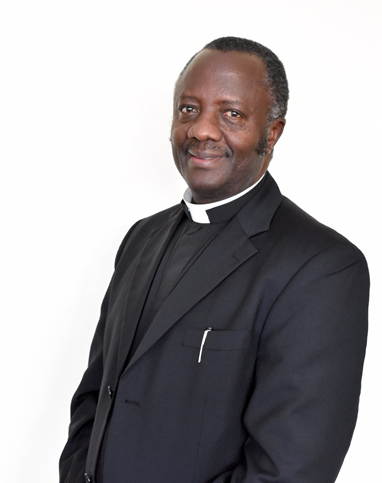
Rev. Dr Fidon Mwombeki, general secretary, All Africa Conference of Churches
“COVID-19 is far from over and it continues to cause disruptions in the way communities and congregations conduct their activities and actions. The strict adherence to the guidelines in prevention and management has made life difficult and sometimes impossible to cope with.
As church leaders, as we continue to provide hope by promoting acts of solidarity, care and compassion that help mitigate the humanitarian impact of COVID-19 in our communities, we must use the opportunity and our influence to communicate factually, effectively and consistently using credible sources which provide accurate and life-saving information on COVID-19 prevention, management and control.
We have a long history of vaccinations saving millions of lives, and as such we should reject the conspiracy theories against scientific evidence and advocate for everyone to get vaccinated against the deadly COVID-19 virus, avoiding nationalistic tendencies which may isolate countries without many resources. This should be done through a coordinated approach to reach all who need it, as a matter of justice.”
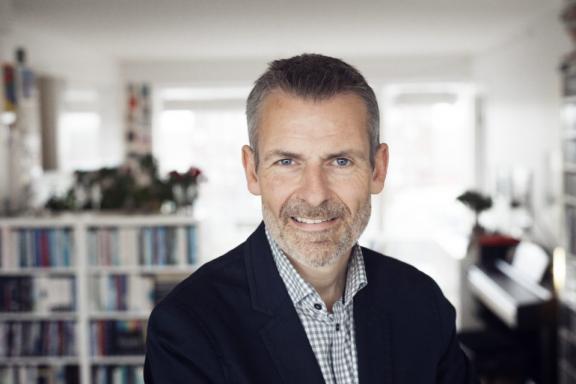
Dr Jørgen Skov Sørensen, general secretary, Conference of European Churches
“The past year has been a year like no other. The COVID-19 pandemic had an impact on our lives in ways few had envisaged. While we kept a distance, the world still came closer.
The concerted efforts from scientists have brought the world efficient vaccines, which together with other measures can ensure healthy and safe societies in the world.
Immunization has begun in most countries. We see light at the end of the tunnel. I look forward to receiving my jab and cannot wait to hug my first grandchild, who was born at the height of the pandemic. I also look forward to worshipping in a crowded church again.
And I look forward to seeing a world working together towards secure vaccines for all, so it is possible for everyone to hug their family members and gather in their holy places. Until everyone is safe, no one is safe. Together we can reach that day.”

Jim Winkler, president and general secretary, National Council of the Churches of Christ in the USA
“The National Council of Churches USA (NCCUSA) joins the World Council of Churches and UNICEF annual World Immunization Week, 24-30 April 2021. We support this effort to save lives and relieve the burden on healthcare facilities.
“I believe it is our faithful responsibility as followers of Jesus Christ to take the vaccine against COVID-19 so that we can be part of the global effort to overcome the pandemic.
As part of this effort, the NCCUSA has joined Faith4Vaccines, a multi-faith effort led by the NCCUSA, Union for Reform Judaism, National African American Clergy Network, Islamic Medical Association, Sojourners, and Network for Religious and Traditional Peacemakers.
Our shared goals are to demonstrate religious communities’ trust in the vaccine, support houses of worship and faith communities to innovatively distribute vaccines, create space for multi-faith collaboration, and pave the way for global, equitable vaccine distribution.”

Pastor Peter Noteboom, general secretary, Canadian Council of Churches
“Of all the commandments, which is the most important?
The most important one is this: ‘Hear, O Israel: The Lord our God, the Lord is one. Love the Lord your God with all your heart and with all your soul and with all your mind and with all your strength.’ The second is this: ‘Love your neighbor as yourself.’ There is no commandment greater than these. (Mark 12:28-31 NIV)
In this pandemic, what better way to love the Creator God and to love your neighbour than to get vaccinated, advocate for vaccination for all, and contribute time and money to ensure everyone around the world has access to vaccines? The COVID-19 virus does not discriminate. Our response must also not discriminate. We must make vaccines available for everyone everywhere.”

Rev. James Bhagwan, general secretary, Pacific Conference of Churches
“If, as Christians, we are committed to loving God with all our heart, soul, strength and mind and our neighbour as ourselves; if we proclaim life in abundance for all, our response to the COVID-19 pandemic must demonstrate this.
Our care as God's people for God's people means we must take every precaution to protect ourselves and others. We pray for the patients, their families and our frontline workers and for their health and safety. At the same time, we put our trust in the knowledge and skills with which God has gifted our health workers—doctors, nurses and health staff. And we follow their directions.
My wife and I received our first dose of the #astrazeneca vaccine to not only protect ourselves, but as our responsibility towards our family, coworkers and community. Whatever you think about or who you blame for COVID-19, or the motives and conspiracies etc, vaccination is important.
But willingness to be vaccinated is only part of the equation, it is important that there is vaccine equity and those communities and groups who urgently need vaccines have access to a full vaccination programme.”

Dr Mathews George Chunakara, general secretary, Christian Conference of Asia
"Although vaccines are one of the most successful and cost-effective health interventions and their proven effectiveness has been widely recognized, millions of children in the world lack immunization coverage. One out of three under-immunized children in the world lives in South Asia. The dearth of adequate vaccines and lack of awareness and trust in vaccination are often hindering successful vaccination drives in the region. As COVID-19 vaccines begin to be rolled out gradually, there exist alarming disparities in access to them across the world. Access to vaccines as well as misinformation and mistrust remain a challenge even in the midst of the horrifying catastrophic impact of the pandemic. Considering the need for intensifying vaccinations to combat the pandemic, the Asian churches are now engaged in advocacy for an effective vaccination drive and also in urging members across Asia to promote health-seeking behaviour at the grassroots in order to make this world healthier."
Let’s heal the world and protect our neighbours!
You can join the WCC Vaccine Champions in raising awareness:
- Find out which vaccinations are recommended for you and your family and how you can get them.
- Help others find reliable information about vaccination, for example at www.unicef.org/immunization
- Take a photo of yourself getting vaccinated (or registering to be vaccinated) and share it in social media with the hashtags #VaccinesWork #WCC
Thank you for being a loving neighbour!
-
-
Le COE répond à vos questions sur les vaccins
28 Avril 2021 -
Les Champions de la vaccination du COE prêts à servir
28 Avril 2021 -
-
